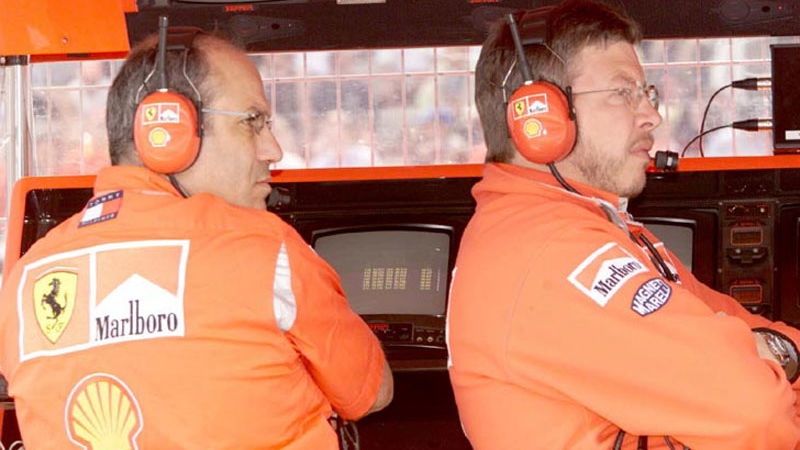F1 feature: Ignazio Lunetta, research.
Holding his thumb and forefinger about a centimeter apart, Ignazio Lunetta, head of research and development at Scuderia Ferrari Marlboro, modestly describes himself as just a small cog in the Ferrari racing legend.

Holding his thumb and forefinger about a centimeter apart, Ignazio Lunetta, head of research and development at Scuderia Ferrari Marlboro, modestly describes himself as just a small cog in the Ferrari racing legend.
Like every 'cog' in the well-oiled Ferrari machinery, it will not work as efficiently without him, his job being a vital role in the continuing successes of the team. After 5-years of learning his trade with the modest Italian Osella team from 1984-1989, then a two-year stint at Alfa Romeo as project leader for their touring car effort, he joined Scuderia Ferrari in 1992.
He spent six months running the test team program before becoming race engineer to Jean Alesi, the Frenchman's sixth race engineer since joining Ferrari in 1991.
One of the current strength's of Ferrari is matching the right man to the right job. Lunetta also has Sicilian origins and could connect with Alesi better than most. Things improved greatly in the three-and-a-half years they worked together, culminating in Alesi's first and only Grand Prix win in Canada in 1995, and the first ever for Lunetta as a race engineer on what was his 100th Grand Prix.
In 1996, Ignazio became Michael Schumacher's race engineer, a job he remained in until the end of the 1999 season to became head of race engineers in 2000. Winning races became the norm and in 2000 Jean Todt invited him to join Schumacher on the podium of the Canadian GP, to accept the constructor's trophy. "It was a very special moment for me," says Lunetta, still vividly remembering the occasion as one of the highlights of his career.
"In the early days you would go to the race hoping that the car would not break and that it would finish the race. In recent years we go to the races knowing we have a chance of winning and that is the biggest change and greatest motivation for everyone working for the team," explains Lunetta.
Success breeds success they say, and that is never more true than in a Grand Prix team where everyone from the driver down has to have the same hunger to win and dedication to the job. "Michael is a good example. He is constantly working to try and be the best, he is involved in the life of the team and brings the human aspect to the job that motivates everyone to give their best in return."
Another secret of Ferrari's success is the methodology that now prevails throughout the team, despite a multi-national workforce that could easily be mistaken for a meeting of the United Nations. Understanding the strength's and weaknesses of the hundreds of team members is another key to the team's success with Directors like Ross Brawn, Paolo Martinelli or Jean Todt's management skills helping create a good atmosphere that encourages people to give more than just their time to team.
In 2000, Lunetta felt he had more to give the team than his race engineering skills and he took on the new challenge of heading up the R&D department, for which he has a staff of ten men dedicated to the task of making the current and future cars go faster and operate more efficiently and reliably.
He rarely attends the races these days. Only those that might be of a particular technical challenge to the team, like Canada, his first race this year. "I spend a lot of my time in meetings," smiles Ignazio, starting with one immediately after each race. "Win or lose, after every race we analyze every detail of the performance of the weekend to see where we could have improved. Like that we add to our data base which helps us not to make the same mistakes in the future," he says.
Every aspect and angle of the car is analyzed by those responsible for each part and everything discussed and considered that might improve it or its next generation. "Any engineer, or anyone else for that matter, can come to me with special problems or what he thinks might be a good idea to improve the car in some way or another. Another part of my job is to select those ideas that look promising and then discuss them further with other heads of departments in meetings. The ideas that are accepted, I then delegate to engineers for further study and development."
On a race weekend, Lunetta and his engineers will also analyze the mass of live data coming from the track and then make suggestions about how to help improve the car or solve problems it might be having.
Lunetta might describe himself as a small cog, but like a perfect timepiece the Ferrari team needs all those vital cogs to function correctly for race after race and become the force that it has in recent years. He is happy in his new job, but like everyone in a successful team never completely happy. "You always think you can do better," he says.
